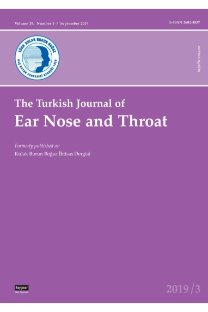Do Tumor Board Recommendations Influence the Decisions of Clinicians in Planning the Treatment of Head and Neck Cancers?
Objective: The aim of this study is to compare the decisions made at established tumor board meetings for planning the treatment of head and neck cancer patients with the individual treatment decisions of clinicians who attended the meetings. Material and Methods: A total of 188 patients with head and neck tumors were included in this study, all of whom had been evaluated at weekly tumor board meetings at our clinic. The tumor board consisted of otolaryngologists, radiation oncologists, medical oncologists, pathologists, and radiologists. Before the board meetings, all data belonging to the patients were given to the otolaryngology surgeons and radiation oncologists who were to attend. Their treatment preferences were asked of them individually. The treatment options that clinicians recommended individually prior to board meetings were compared with the decisions made by the tumor board. Results: It was observed that 34% (64 cases out of 188) of the individual decisions made by ENT surgeons and 34.6% (65 cases out of 188) of those made by radiation oncologists changed following tumor board meetings. There was a statistically significant difference between the treatment options offered individually by both ENT surgeons and radiation oncologists and the treatment recommendations made by the tumor board. Conclusion: According to the data we obtained, the recommendations for treating patients with head and neck cancers made by the tumor boards may differ from the personal decisions of attending clinicians. Therefore, to make decisions that ensure the highest quality patient care, we believe it is necessary to evaluate all patients with head and neck tumors at multidisciplinary tumor board meetings regardless of cancer stage.
Keywords:
Head and neck cancer, multidisciplinary team, tumor board,
___
- 1. Bray F, Ferlay J, Soerjomataram I, Siegel RL, Torre LA, Jemal A. Global cancer statistics 2018: GLOBOCAN estimates of incidence and mortality worldwide for 36 cancers in 185 countries. CA Cancer J Clin 2018;68:394-424. google scholar
- 2. Brunner M, Gore SM, Read RL, Alexander A, Mehta A, Elliot M, et. al. Head and Neck Multidisciplinary Team Meetings: Effect on Patient Management. Head Neck 2015;37(7):1046-50. google scholar
- 3. Eskander A, Irish J, Groome PA, Freeman J, Gullane P, Gilbert R, et al. Volume-outcome relationships for head and neck cancer surgery in a universal health care system. Laryngoscope 2014;124:2081-8. google scholar
- 4. Bozec A, Culi e D, Poissonnet G, Dassonville O. Current role of primary surgical treatment in patients with head and neck squamous cell carcinoma. Curr Opin Oncol 2019;31(3):138e145. google scholar
- 5. Lee VHF, Chan JYW, Vardhanabhuti V, Kwong DLW, Leung TW, Chan SY, et al. Advancing Care for Head and Neck Cancers in a Multidisciplinary Tumour Board in the East. Clin Oncol (R Coll Radiol) 2019;31(8):549-59. google scholar
- 6. Guy JB, Benna M, Xia Y, Daguenet E, Ben Mrad M, Jmour O, et al. Quality Insurance in Head and Neck Cancer Multidisciplinary Team Meetings: A Watchful Eye on Real-Life Experience. Oral Oncol 2019;91:35-8. google scholar
- 7. Nguyen NP, Vos P, Lee H, Borok TL, Karlsson U, Martinez T, et al. Impact of Tumor Board Recommendations on Treatment Outcome for Locally Advanced Head and Neck Cancer. Oncology 2008;75(3-4):186-91. google scholar
- 8. Aquinas T. Prologue. In: On being and essence. Pontifical Institute on Mediaeval Studies; 1968. p.1. Translated by Armand Maurer. google scholar
- 9. Westin T, Stalfors J. Tumour boards/multidisciplinary Head and Neck Cancer Meetings: Are They of Value to Patients, Treating Staff or a Political Additional Drain on Healthcare Resources? Curr Opin Otolaryngol Head Neck Surg 2008;16(2):103-7. google scholar
- 10. Mullan BJ, Brown JS, Lowe D, Rogers SN, Shaw RJ. Analysis of Time Taken to Discuss New Patients With Head and Neck Cancer in Multidisciplinary Team Meetings. Br J Oral Maxillofac Surg 2014;52(2):128-33. google scholar
- 11. Haddad R, Annino D, Tishler RB. Multidisciplinary approach to cancer treatment: focus on head and neck cancer. Dent Clin North Am 2008;52(1):1-17. google scholar
- 12. Thenappan A, Halaweish I, Mody RJ, Smith EA, Geiger JD, Ehrlich PF, et.al. Review at a Multidisciplinary Tumor Board Impacts Critical Management Decisions of Pediatric Patients With Cancer. Pediatr Blood Cancer 2017;64(2):254-8. google scholar
- 13. Boxer MM, Vinod SK, Shafiq J, Duggan KJ. Do Multidisciplinary Team Meetings Make a Difference in the Management of Lung Cancer? Cancer 2011;117(22):5112-20. google scholar
- 14. Pillay B, Wootten AC, Crowe H, Corcoran N, Tran B, Bowden P, et. al. The impact of multidisciplinary team meetings on patient assessment, management and outcomes in oncology settings: A systematic review of the literature. Cancer Treat Rev 2016;42:56-72. google scholar
- 15. Wheless SA, McKinney KA, Zanation AM. A prospective study of the clinical impact of a multidisciplinary head and neck tumor board. Otolaryngol Head Neck Surg 2010;143(5):650-4. google scholar
- ISSN: 2602-4837
- Yayın Aralığı: Yılda 4 Sayı
- Başlangıç: 1991
- Yayıncı: İstanbul Üniversitesi
Sayıdaki Diğer Makaleler
Fakih Cihat ERAVCI, Hakan TUTAR, Ağah YENİÇERİ, Mücahit YALÇIN
Pauline YAP, Nurul Syazana Mohamad SHAH, Wan Azman Wan SULAİMAN, Siti Fatimah Mat JOHAR, Arman Zaharil Mat SAAD
Wan Azman Wan SULAİMAN, Pauline YAP, Nurul Syazana Mohamad SHAH, Siti Fatimah Mat JOHAR, Arman Zaharil Mat SAAD
Nasrettin Fatih TURGUT, Dilek GÜLMEZ, Hasan Ahmet ÖZDOĞAN
Gökhan AKGÜL, Nasrettin Fatih TURGUT, Mehmet Dursun MEHEL, Serap AYDOĞDU, Abdulkadir ÖZGÜR
Ağah YENİÇERİ, Fakih Cihat ERAVCI, Mücahit YALÇIN, Hakan TUTAR
Abdulkadir ÖZGÜR, Gökhan AKGÜL, Nasrettin Fatih TURGUT, Mehmet Dursun MEHEL, Serap AYDOĞDU
